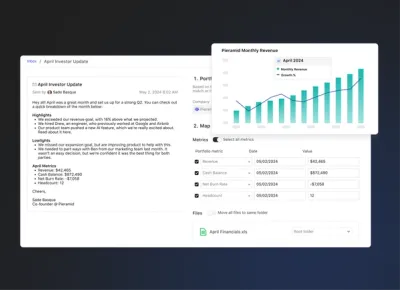
If you step back to the 1990s, very few financing options existed for startups. The venture capital space was dominated by a few large firms. Founders had to turn to their personal bank account, loans, or family and friends to raise capital for their business.
In the early 2000s the internet takes the world by storm. The capital required to build a business begins to decline and new investors step in to help more entrepreneurs start companies (like Y Combinator in 2005). A few years after YC and we see more venture capital firms and financing options pop up.
Today the financing and investor options for founders continue to evolve. The rise of rolling funds, pre-seed funds, and seamless revenue financing has allowed more entrepreneurs to secure the right financing for their business. If you’re deciding what investors to raise from, check out the different types of investors below:
Recommended Reading: The Understandable Guide to Startup Funding Stages

6 Types of Startup Investors
Throughout the lifecycle of a startup, different financing options and investor types will become available. Depending on the market and stage of the business different investor types may make more sense.
Banks
Traditionally bank loans are the most common type of investor for a company. A bank loan usually requires operating history with revenue to ensure they will get paid back. According to the Small Business Administration, “For established businesses, owner investment and bank credit are the two most widely used kinds of financing.”
Considerations
As the team at Point Park put it, “Loan-seekers will usually be required to produce proof of collateral or a revenue stream before their loan application is approved. Because of this, banks are often a better option for more established businesses.”
Requirements
According to MyCorporation, “To get approved, you typically need to meet requirements like the following:
- You have been in business for 2 years or more
- The business has strong annual revenues (typically at least $100,000)
- Good credit (like a score of 640+)”
Keep in mind that when applying for a loan through a bank, you will be required to share financial documents. Speed up the process by having your financials in order and ready for review by the bank.
Friends & Family
When a founder has a product or service they are ready to take to market but no operational history they may turn to equity investors to help with initial capital.
Considerations
When raising capital from friends and family, it is incredibly important to be transparent during the process. Early stage companies are generally a very risky investment and can lead to a loss of capital. Consider who has expendable income in your immediate network when reaching out.
Keep in mind that if they are buying equity in your company, your business relationship will exist for the foreseeable future — remember to choose individuals that you can build a business relationship with.
Requirements
While there are no requirements when raising capital from your friends and family there are major risks involved. Make it clear why they should invest in you or your business. You will likely not need to formally pitch them as you would a venture capitalists but it is important they understand how they will generate returns on their investment. As we mentioned above, be transparent about the investment and make it clear that there is a chance they will lose their investment.
Angel Investors
Like venture capitalists, angel investors buy equity in startups. An angel investor is generally a wealthy individual who is looking to invest spare cash in an alternative investment. As we wrote in our post,How to Effectively Find + Secure Angel Investors for Your Startup, “This means that an angel investor may have alternative motives (personal interest in the problem, product, founders, etc.) whereas a venture capital firm is focusing on maximizing their returns.”

Considerations
A step above a “family & friend” investor, an angel has a better understanding of the risk at hand and more experience in the space. Oftentimes, angel investors are all around you and you may not realize it. As Elizabeth Yin puts it, “Angels may not know they are angels. It’s your job to plant the seed in their heads that you are open to an investment from them!”
Requirements
Like friends and family investors, there are no strict requirements when raising capital from angels. As most venture capitalists invest in software-enabled businesses, large markets, companies with huge valuation upside, etc. angel investors can fill the void for countless other businesses.
Whereas a traditional investor is looking for returns, an angel investor might be intrigued and motivated by other things. As Elizabeth Yin goes on to write, “Angels are motivated by many different things; figure out how to tie your story to something that they want; getting an investment – much like sales – is about solving for their needs not yours.” With that said, the requirements of the pitch may be slightly different as you may want to hit on things outside of financials and the market.
Related Resource: Top 6 Angel Investors in Miami
Venture Capitalists
Going a step deeper in the equity financing world are venture capitalists. Unlike angel investors, venture capital firms are professional investors dedicated to generating returns for their limited partners (LPs). As we explain in “Our Guide to How Venture Capital Works,” venture capital firms can generally be split into 3 main buckets (however, this can be broken down much more granularly).
Related Resource: How to Create a Startup Funding Proposal: 8 Samples and Templates to Guide You
Related Resource: What Is a Limited Partnership and How Does It Work?

- Early-stage/Pre-seed/Seed — Early stage firms are responsible for making one of the first investments in a company. They are generally investing in the team, product, or market in hopes of the company executing and generating returns. Oftentimes the riskiest investments with the most upside.
- Series A/B — Series A/B investors are generally in search of companies that have started generating serious revenue and have found product market fit.
- Expansion/Growth — Expansion and growth stage investors are looking for companies that are en route to an IPO or major acquisition (sometimes similar to a private equity firm). They write huge checks in huge companies.
Considerations
As venture capitalists cover just about every stage and every vertical, it is important to find the right investors for your business. The venture capital fundraising process can be extremely intimidating and generally requires a system, similar to a B2B sales process, to keep things organized and efficient. Consider how much capital you are raising and at what valuation. From there, start to target the right investors for your business. To learn more about finding the right investors for your business, check out this post.
- Related Reading: Everything a Startup Founder NEEDS to Know about Pro Rata Rights
- Related Reading: 23 Top VC Investors Actively Funding SaaS Startups
- Related Reading: How to Secure Financing With a Bulletproof Startup Fundraising Strategy
- Related Resource: How to Model Total Addressable Market (Template Included)

Requirements
Different venture capitalists will have different requirements. Obviously a pre-seed investor will have an entirely different set of requirements than a series B+ investor. There are countless tools and databases to help understand what VCs are right for your business — like our own database, Visible Connect. To learn more about requirements and benchmarks for different VC firms, check out our post, “The Understandable Guide to Startup Funding Stages.”
Related Reading: Building A Startup Financial Model That Works

Crowdfunding
Over the last few years, crowdfunding has become a more popular way to raise equity financing. As the team at Republic defines it, ‘Crowdfunding is a way to raise money from a large number of people. Large groups of people pool together small individual investments to provide the capital needed to get a company or project off the ground. Individuals, charities or companies can create a campaign for specific causes and anyone can contribute.”
Considerations
Raising equity crowdfunding is a slightly different process than raising from angels and venture capitalists. Most solutions allow you to create a page/profile where investors will decide to invest (as opposed to one off pitches). A few popular equity crowdfunding solutions:
Requirements
Different platforms will likely have different requirements for companies looking to raise equity crowdfunding. Generally the companies are vetted by the platform before being posted for investment. Check out different platforms to understand their requirements.
Related resource: Understanding The 4 Types of Crowdfunding
Fundraising Disruptors
There has continued to be innovation in the financing space over the last few years. The introduction of rolling funds has transformed how VCs can raise from LPs. There has also been an explosion in alternative financing options that can be beneficial to founders.
Considerations
There has been an explosion of alternative financing options over the past few years. More options means more opportunities for founders. A few of our favorites that have popped up in the market:
Pipe turns MRR into ARR. It’s a trading platform for recurring revenue streams to get upfront capital. As we wrote in our post, Alternatives to Venture Capital,
“For example, if you have a customer paying $1000/mo then the annual value would be $12,000. Let’s assume they are taking 10% (purely a guess, we are not sure what the actual terms are) that would result in $10,800 in cash ($12k*90%).
This allows SaaS companies to get cash up front and hold in their bank account or use for customer acquisition. Presumably, their % take is less than what most SaaS companies offer for an annual discount as well.”
“Earnest Capital provides early-stage funding, resources and a network of experienced advisors to founders building sustainable profitable businesses.” Earnest Capital uses their own financing instrument called a Shared Earnings Agreement (SEAL). Essentially, SEALs are geared towards bootstrapped companies who are profitable or approaching profitability.
Rather than explaining it ourselves we’ll let the Corl website explain what they do. “Corl uses machine learning to analyze your business and expedite the funding process. No need to wait 3-9 months for approval.
Corl can finance up to 5x your monthly revenue to a maximum of $1,000,000. Payments are equal to 1-10% of your monthly revenue, and stop if the business buys out the investment for 1-3x the investment amount.”
To learn more about new and alternative financing options, check out this post.
Requirements
Each alternative financing option will have very different requirements. However, most of these options set clear expectations and requirements that will allow you to apply and/or qualify in a matter of minutes or days.

Summary
At the end of the day, every business is different. Each business has their own set of needs and expectations. Understand what type of investor will be most beneficial to your business and form a gameplan to raise capital.
As more financing options become available, more founders and startups will have opportunities to succeed. No matter what type of capital you decide to raise — pick the investor that can help your business the most, not the investor that will look best in headlines.
To learn more about raising capital, check out our blog here.
If you are raising venture capital, check out Visible Connect, our investor database, to kickoff your round. We personally verify investor profiles to make sure their data is up-to-date. From there, add investors directly to our Fundraising CRM, to keep tabs on your raise.





